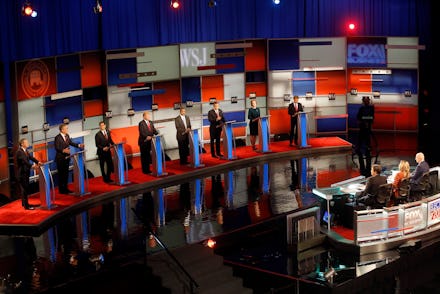Who Won Fox Business Republican Debate? Here Are the GOP Candidates Who Stood Out

The eight top-polling Republican presidential contenders faced off in the party's fourth primary debate at the Milwaukee Theatre in Milwaukee on Tuesday. While it was unclear immediately following the Fox Business Network debate which GOP hopefuls got a boost and which sank, a few candidates — Texas Sen. Ted Cruz, Florida Sen. Marco Rubio and Kentucky Sen. Rand Paul — delivered performances that earned them standout reviews on social media.
Twitter users started declaring early wins for each of the three candidates an hour into the debate:
Paul, who's kept a relatively low profile at previous debates, had one of the night's biggest moments when he attacked Rubio's lavish military spending plan, a strategy that strays from traditional conservative budget policies, the Washington Post reports. "You get something that looks to me not very conservative," Paul told Rubio of his spending plan. "Can you be a conservative, and be liberal on military spending?"
Rubio shot back, saying not spending money on the military bears a higher cost. "I know that Rand is a committed isolationist," Rubio said.
"I know that the world is a safer and a better place when the United States is the strongest country in the world."
Paul also fact-checked Trump when the real estate magnate said the Trans-Pacific Partnership, a proposed trade agreement between nine countries, including the United States, was a "horrible" deal that only helps China, when Paul pointed out that China isn't a part of the deal.
Cruz attempted to woo middle class voters when he asserted that he would "absolutely not" bail out big banks and would let Bank of America fail if it were about to. "The rich do great with big government, they get in bed with big government," Cruz said.
The Texas senator also earned a boisterous applause when he backed up Trump's immigration plan, arguing that it's "not anti-immigrant."
"I understand when the mainstream media covers immigration, it often doesn't see it as an economic issue, but I can tell you for millions of Americans at home watching this, it is a very personal economic issue," Cruz said. "I would say the politics of it would be very, very, different if a bunch of lawyers or bankers were crossing the Rio Grande — or if a bunch of people with journalism degrees were coming over and driving down the wages in the press."